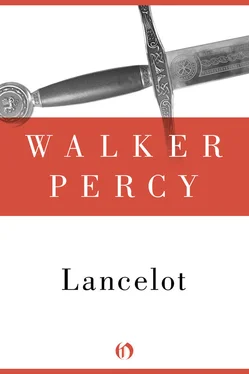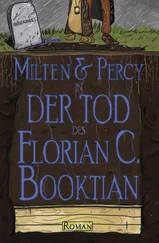It was after nine. Nothing was changed, except me. My “discovery” changed everything. I’ve become watchful, like a man who hears a footstep behind him. And sober. For some reason or other, since my “discovery” at 5:01 p.m., more than four hours ago, it had not been necessary to drink.
Merlin as usual went out of his way to be nice to me. He liked me and I him. His charm was genuine. He deferred to me as his local expert on the Southern upper class and asked good questions: “Was there much socializing between the English plantation society on this side of the river and the French-Catholic on the other?” (Yes, there was. They’d row back and forth across the river and dance all night.) His ear was sharp: “I notice people here, not necessarily the lower classes, saying something like: ‘Why you do me that?’ instead of ‘Why do you do that to me?’ Is that Black, French, or Anglo-Saxon?” (I didn’t know.)
His blue gaze engaged me with a lively intimacy, establishing a bond between us and excluding the others. Somehow his offense against me was also an occasion of intimacy between us. I felt it too. Things were understood and unspoken between us. It went without saying for example that actors are dumbbells. Not even Margot followed us when he spoke of Tate’s “Ode to the Confederate Dead” and Hemingway’s nastiness to Fitzgerald.
It was as if we were old hands at something or other. But at what? Why should there be a bond between us? But he listened with total attentiveness, leaning across to me over his folded brown arms. He was lean and fit and old, muscular, thick-chested, heavy shock of yellowed gray hair curling over one eye. He had emphysema, I think: his neck ligaments held his chest up like a barrel. No sign of considerable age except the white hairs sprouting over the zipper of his jump suit and the white fiber around his blue iris.
Margot had a triumphant night, I remember. They were worried about the “second unit” falling behind schedule. The second unit was supposed to shoot a scene, the opening scene of the film in fact, a flashback where the young son comes home from Heidelberg, steps off the steamboat at the plantation landing. They had rented a steamboat (a New Orleans excursion boat), found a landing in Grand Gulf, but the current was wrong and the boat could not warp into a landing. Days had been wasted, thousands spent.
“The board is four days out,” said Margot severely. The “board” was actually a board with paper chits stuck onto it like a calendar, showing the exact sequence of scenes to be shot. About Margot there was very much the sense of being a team member. She was in fact Merlin’s “executive assistant.”
What to do? Build another landing in a place with less current? More time, more money. Raine and Dana couldn’t care less. Lacy, my daughter, didn’t even hear. She was looking at Raine as usual, mouth slightly open.
Margot knitted her brows and drummed all ten fingers furiously on the table. “Jesus, we can’t lose another day.” She even enjoyed the hassles.
Margot saved the day. In fact her triumph was complete.
She snapped her fingers. “Hold it!” she said to no one in particular. “Just hold it. I may have an idea. Let me make one phone call.”
When she returned, she was flushed with pleasure and excitement, but she kept her voice offhand. “What about this, Bobby?” she asked Merlin, stretching up her arms and yawning. When she stretched up her arms like that, her completely smooth axillae flattened and showed two wavelets of muscle.
She had remembered there was a steamboat on False River, a cut-off backwater of the Mississippi. “It’s small, almost a miniature, but so are the landings there. And there’s no current. What we could do is a long shot of the boat coming into the Dernier landing, which is tiny, of a scale with the boat. I know the Derniers well. What’s more, the Dernier house even looks like a miniature Belle Isle. You could cut to the roofline over the levee and no one could tell the difference.”
Merlin thought about it. He nodded. “We’ll go with that,” he said casually, almost curtly, without looking at her. She could have been a pool secretary. “Okay. Call Jacoby.”
It was the businesslikeness of course which pleased her so much. Now she was not only one of them but a valued one.
When she was happy or excited, her freckles turned plum-colored. Her pigment darkened with the moon. I could gauge her sexual desire by her freckles.
Then surely my “discovery” was wrong. She was as happy as a child, so happy she reached over and hugged me, not Merlin. Merlin paid no attention to her. His white-rimmed blue eye engaged mine as usual. He wanted to talk about an article of mine, really no more than a note, about an obscure Civil War skirmish in these parts, published in the Louisiana Historical Journal. He had taken the trouble to look it up.
As usual I was first to leave the table. It was my custom (all of a sudden I realized how much of my life had become a custom) to leave them to their movie talk, pay a visit to Siobhan and Tex, and arrive at my pigeonnier in time for the ten o’clock news. It had become important to me in recent years to hear the news every hour — though nothing of importance had happened for years. What did I expect to happen?
But this time I did something different. I left the worn path of my life. Once out of sight, instead of crossing to the stairs. I turned left into the dark parlor next to the dining room, from which it was separated by sliding oak doors. A few minutes earlier I had noticed that the door was open some six inches. It was possible, standing with my back against the door, to hear the diners and by moving from side to side to see their reflection in the dim pier mirror on the opposite wall. The images traveled some fifty feet, thirty feet from diner to mirror, twenty feet back to me. Lucy, my daughter, was at one end of the table. Even from this distance it was possible to see in the small blur of her face how like and unlike her mother she is, Lucy, my first wife. There is the same little lift and lilt when she moves her head but the features are both grosser and more gorgeous, like a Carolina wildflower transplanted to the Louisiana tropics. For her, Lucy. Belle Isle was no more than a place to stay. We were not close. She and Margot didn’t like each other much. My son? I had not seen my son since he quit college and went to live in a streetcar behind the car barn.
Presently Lucy left.
Margot, Merlin, and Dana talked. There was the sound in their voices of my not being there.
Two small events occurred.
Margot leaned over Merlin to say something to Raine I could not hear, her hair brushing past his face. When Margot spoke, she had a way of swaying against her listener, so that her shoulder and arm touched him. He leaned back, absently, politely, to make room, but as her shoulder rose — is her hand propped on his knee? he took a mock bite of the bare brown flesh at his mouth, not really a bite; he set his teeth on the skin. So perfunctory an act it was, he hardly seemed aware of doing it. His fixed blue gaze did not shift.
“Okay,” said Merlin presently. “So we’ll use the pigeonnier for Raine and Dana’s fight. I agree. The checkerboard lighting pattern would be much more effective than a slave cabin. Still, I like—”
“What about Rudy?” Dana asked, I think he asked. Rudy? What was Rudy? Did he say Rudy? I don’t think he said Rudy.
No one seemed to be listening.
“What?” said Merlin after a minute.
Raine bobbed her head to and fro, propping and unpropping her cheek with her finger, hair falling away. She was humming a tune.
Again Margot leaned across Merlin to answer. I could not hear.
I could hear my absence in Raine’s voice. She was different. There had grown up between us a kind of joking flirtation. She was Dana’s girl, of course. But I could tell her how beautiful she was (she was) and unbend enough to kiss her when we met, kiss on the mouth the way they all do. She could tell me how beautiful I was (am I?). When we were in a room with people, there existed a joking agreement between us that she would be attentive to me, would not turn her back even if she is talking to someone else. It was as if we pretended to be married and jealous of each other. But now without me she was different.
Читать дальше












